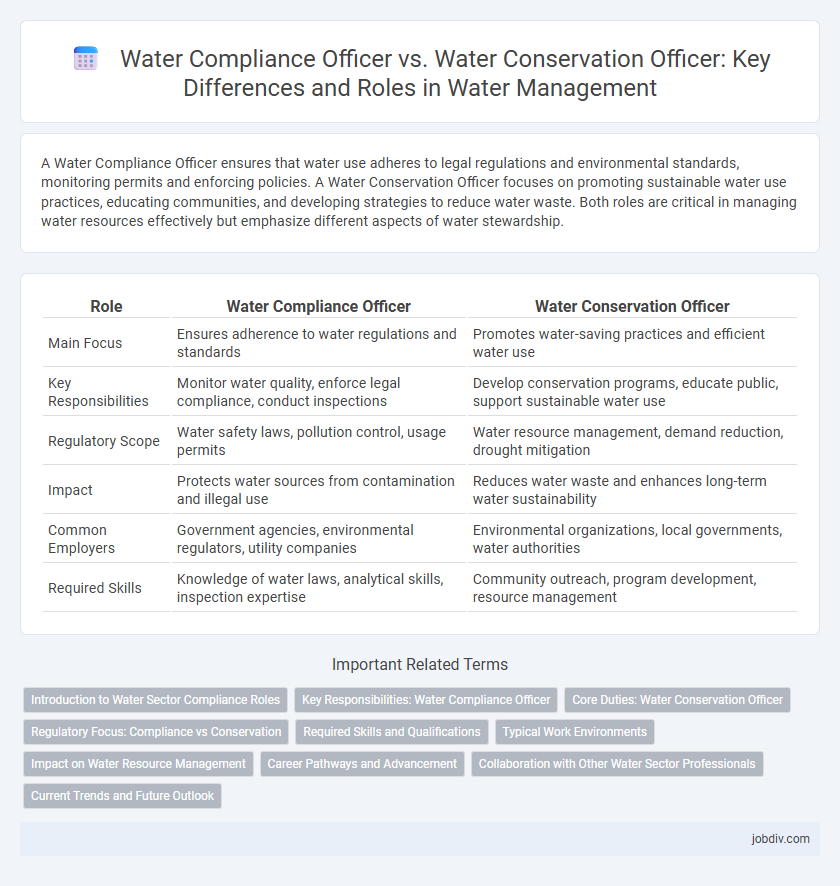A Water Compliance Officer ensures that water use adheres to legal regulations and environmental standards, monitoring permits and enforcing policies. A Water Conservation Officer focuses on promoting sustainable water use practices, educating communities, and developing strategies to reduce water waste. Both roles are critical in managing water resources effectively but emphasize different aspects of water stewardship.
Table of Comparison
| Role | Water Compliance Officer | Water Conservation Officer |
|---|---|---|
| Main Focus | Ensures adherence to water regulations and standards | Promotes water-saving practices and efficient water use |
| Key Responsibilities | Monitor water quality, enforce legal compliance, conduct inspections | Develop conservation programs, educate public, support sustainable water use |
| Regulatory Scope | Water safety laws, pollution control, usage permits | Water resource management, demand reduction, drought mitigation |
| Impact | Protects water sources from contamination and illegal use | Reduces water waste and enhances long-term water sustainability |
| Common Employers | Government agencies, environmental regulators, utility companies | Environmental organizations, local governments, water authorities |
| Required Skills | Knowledge of water laws, analytical skills, inspection expertise | Community outreach, program development, resource management |
Introduction to Water Sector Compliance Roles
Water Compliance Officers ensure adherence to environmental regulations and water quality standards by monitoring discharge permits and enforcing relevant laws. Water Conservation Officers focus on promoting efficient water use, implementing conservation strategies, and educating the public on sustainable water management practices. Both roles are essential in maintaining regulatory compliance and supporting sustainable water resource management within the water sector.
Key Responsibilities: Water Compliance Officer
Water Compliance Officers enforce regulations related to water quality and usage, ensuring adherence to federal and state water laws such as the Clean Water Act. They conduct inspections, monitor water treatment facilities, and review permits to prevent pollution and safeguard public health. These officers collaborate with environmental agencies to investigate violations and implement corrective measures to maintain compliance standards.
Core Duties: Water Conservation Officer
A Water Conservation Officer primarily focuses on developing and implementing strategies to reduce water usage and promote sustainable water management practices. Their core duties include conducting water audits, enforcing conservation regulations, and educating the public on efficient water use. This role is critical in safeguarding water resources by monitoring consumption patterns and recommending measures to minimize waste.
Regulatory Focus: Compliance vs Conservation
Water Compliance Officers enforce regulatory standards, ensuring organizations adhere to federal and state water quality laws such as the Clean Water Act. Water Conservation Officers prioritize sustainable water use by implementing conservation policies and promoting efficient resource management to protect water ecosystems. The regulatory focus of Compliance Officers centers on legal adherence and pollution control, whereas Conservation Officers emphasize ecological sustainability and long-term water resource preservation.
Required Skills and Qualifications
Water Compliance Officers require expertise in environmental regulations, water quality standards, and risk assessment to ensure adherence to local, state, and federal water laws. Water Conservation Officers must possess skills in resource management, public education, and sustainable practices, alongside knowledge of hydrology and ecosystem preservation. Both roles demand strong analytical abilities, communication skills, and often credentials such as certifications in environmental science or water resource management.
Typical Work Environments
Water Compliance Officers typically operate within regulatory agencies, municipal water departments, or environmental consulting firms, ensuring adherence to water quality standards and legal frameworks. Water Conservation Officers are often found in government environmental agencies, non-profit organizations, or community outreach programs, focusing on promoting sustainable water use and resource management. Both roles may involve field inspections, data analysis, and public education, but their work environments reflect their specific regulatory or conservation mandates.
Impact on Water Resource Management
Water Compliance Officers enforce regulations to ensure industries and municipalities meet legal water quality and usage standards, preventing pollution and safeguarding public health. Water Conservation Officers implement strategies to reduce water waste, promote sustainable usage, and encourage community participation in preserving water resources. Together, these roles significantly impact water resource management by balancing regulation enforcement with proactive conservation efforts.
Career Pathways and Advancement
Water Compliance Officers ensure adherence to environmental regulations and water quality standards through regular inspections and enforcement actions, often requiring certifications in environmental law and water resource management. Water Conservation Officers focus on promoting sustainable water use and implementing conservation programs, with career advancement opportunities in policy development and community engagement roles. Both career pathways offer growth through specialized training, leadership positions, and collaboration with governmental agencies focused on water resource sustainability.
Collaboration with Other Water Sector Professionals
Water Compliance Officers collaborate closely with environmental regulators, utility managers, and legal experts to ensure adherence to water quality standards and regulatory frameworks. Water Conservation Officers engage with urban planners, agricultural specialists, and community leaders to develop and implement strategies aimed at reducing water consumption and preserving water resources. Both roles require effective coordination with engineers, ecologists, and policy advisors to integrate compliance and conservation efforts for sustainable water management.
Current Trends and Future Outlook
Water Compliance Officers ensure adherence to environmental regulations and water quality standards by monitoring pollutant levels and enforcing legal frameworks, with growing emphasis on digital compliance tools and real-time data analytics. Water Conservation Officers focus on promoting sustainable water usage practices and implementing conservation programs, increasingly integrating smart irrigation technologies and community-based resource management to address climate change impacts. Future trends indicate a convergence of roles leveraging IoT and AI for precision monitoring, fostering collaborative efforts between compliance enforcement and conservation initiatives to secure resilient water resources.
Water Compliance Officer vs Water Conservation Officer Infographic

 jobdiv.com
jobdiv.com